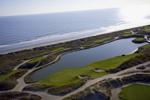Blame Alice Dye, if you must blame someone.
Ocean Course designer Pete Dye thought the par-3 17th hole was difficult enough as he originally laid it out — some 220 wind-swept yards hard by the Atlantic Ocean.
But Mrs. Dye, an accomplished golf-course architect and player in her own right, had a different idea. As the couple worked to build the Ocean Course in time for the 1991 Ryder Cup on Kiawah Island, Alice Dye told her husband the 17th hole wasn't finished yet.

Golf course architect Pete Dye speaks at a news conference during the first round of the PGA Championship golf tournament at Whistling Straits in Haven, Wisconsin, Aug. 12, 2012. File/AP

Alice Dye, late wife of Ocean Course designer Pete Dye. USGA Photo
"I was not going to build a pond on the right side of 17," Dye recalled in a 2016 interview. "But Alice came in and kept telling me, you've got to do this. You've got to get something in there more severe than what I had.
"I was really hesitant to build a pond on the right side of the 17th green because here's the Atlantic Ocean and you are building a pond, you are crazy ... So after she talked to me, I went ahead and built that pond on 17."
Alice's pond has helped make the Ocean Course's 17th one of the iconic par-3 holes in golf, up there with Augusta National's No. 12 at the heart of Amen Corner and Pete Dye's own island-green 17th at TPC Sawgrass.

The par-3 17th hole at the Ocean Course on Kiawah Island has been the site of heartache and drama over the years. Provided photo
It's been the site of heartache and drama at the Ocean Course's signature events, the 1991 Ryder Cup and 2012 PGA Championship, and surely will play a key role in the 2021 PGA Championship, set for May 20-23 on Kiawah Island.
"The par-3 17th was so intimidating that it could make you choke when playing a practice round by yourself," golf legend Johnny Miller said after the 1991 Ryder Cup.
Adam Scott, who won the 2013 Masters, got a look at the 17th before the 2012 PGA Championship.
"It's a very, very difficult hole," Scott said. "Having to hit a 3-iron there in a crucial moment is tough. And factor in some breeze, and it will be even harder."
In 2012, the 17th played as one of the most difficult par-3s on the PGA Tour, with a scoring average of 3.303. That included 31 birdies, 283 pars, 107 bogeys and 28 scores of double bogey or worse. (The Ocean Course's 238-yard par-3 14th was even more difficult, with an average score of 3.323).
The New York Times put it this way: "From an elevated tee along the northeastern shore of the island, the 17th plays 229 yards for the pros over water lining the entire right side of the hole and front of the green. The putting surface may measure 44 yards deep, but the swath of green to land a ball safely is about 15 yards wide, punishing any tee shot that does not hew to the right line."
The 17th also was the site of one of golf history's more infamous meltdowns, during the "War By The Shore" 1991 Ryder Cup between Europe and the U.S.
The Cup was still in doubt during Sunday's singles matches when Mark Calcavecchia built a four-up lead with four holes to play in a crucial singles match with Colin Montgomerie.
First on the tee at 17, Montgomerie hit his tee shot into the pond, leaving Calcavecchia a huge opening to win the hole and the match. But Calcavecchia hit a dead shank into the pond, then missed a 3-foot bogey putt to hand the hole to Montgomerie. The Brit also won the 18th to tie the match and gain a half-point for Europe.
Calcavecchia was inconsolable on the beach, and in a daze even after German Bernhard Langer missed a final putt on 18 to hand the Ryder Cup to the American side.
"Might have been the strangest shot by a pro I've ever seen," Miller said that day.
But Calc shouldn't feel too bad. The list of golfing greats who hit shots into Alice's pond during that Ryder Cup included Paul Azinger, Hale Irwin, Mark O'Meara, Payne Stewart and Chip Beck.
Stewart, Azinger and Beck did it twice.
"course" - Google News
May 02, 2021 at 08:00PM
https://ift.tt/3gVo0n2
Ocean Course's 'punishing' 17th hole owes reputation for drama to Alice Dye - Charleston Post Courier
"course" - Google News
https://ift.tt/35q9ps5
https://ift.tt/35rCFi1
Bagikan Berita Ini
















0 Response to "Ocean Course's 'punishing' 17th hole owes reputation for drama to Alice Dye - Charleston Post Courier"
Post a Comment